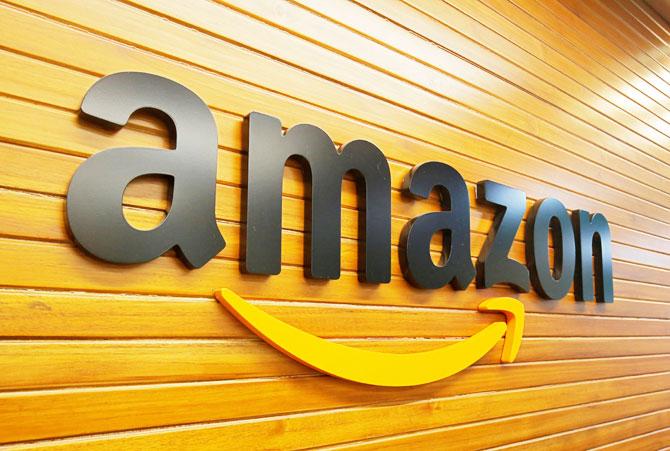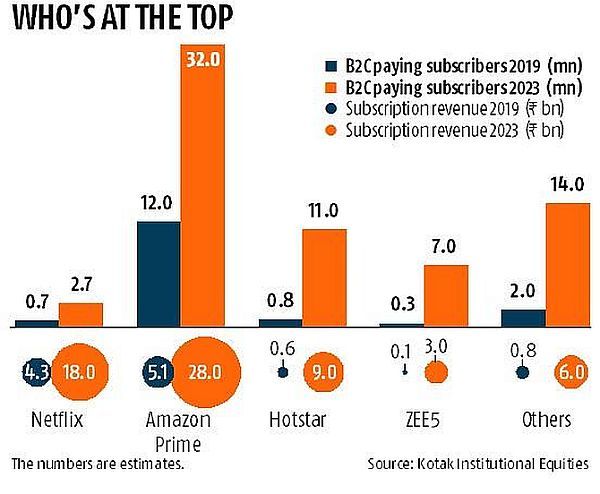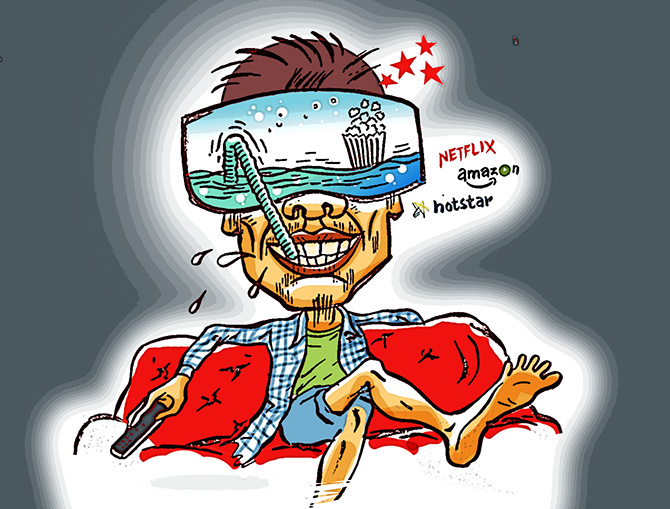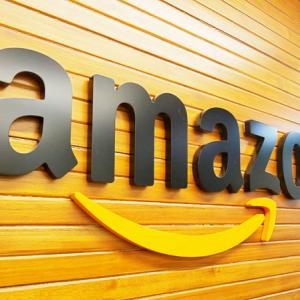Netflix and Prime have decided that rather than only buying the rights to Bollywood blockbusters to expand their reach in India, producing original content would be a better idea.
Surajeet Das Gupta and Urvi Malvania report.

When video-on-demand giants Netflix and Amazon Prime made their quiet entry into India three years ago, they were expected to be premium channels catering only to the top 5% to 10% of English-speaking households.
However, to everyone's surprise, both OTT (over-the-top) players have aggressively moved to grab a larger pie of the Indian entertainment market.
Today, Netflix and Amazon Prime are vying with each other to invest top dollars in producing original content in Hindi and other regional Indian languages.
And 2019 promises to be the year when the duos battle for the Indian turf reaches fever pitch.
Amazon Prime has already announced that it will launch 9 Hindi original shows this year, which is more than double of what it did last year.
An original Tamil show is on the cards as well.
It also wants to expand its regional language reach -- it currently offers content in 7 languages.
Amazon Prime feels it can amortise the cost of production by offering these shows in global markets where there is demand for Indian content.
For instance, 40% of the viewers of Breathe, a Hindi crime drama, is said to have come from abroad.
In no mood to concede ground to its arch rival, Netflix too has announced 8 new original films and television series in Indian languages.
This is the streaming platforms largest investment in bringing original content in regional languages in a single year.
Netflix did about 7 series and films in the last three years.
In short, both players have decided that rather than only buying the rights to Bollywood blockbusters to expand their reach in India, producing original content would be a better idea.
Hence, both are furiously inking deals with Indian production houses to come up with quality content.
Amazon has a tie-up with Excel Entertainment, which is co-owned by Farhan Akthar and Ritesh Sidhwani.
And Netflix is partnering with Shah Rukh Khan's Red Chillies Entertainment to produce, among others, Bard of Blood, based on Bilal Siddiqui's novel of the same name.
It has also roped in top stars such as Priyanka Chopra, Anushka Sharma, Madhuri Dixit and so on, to produce programming.
While both sides are tight-lipped about their numbers, Kotak Institutional Equities projects that in FY19 direct-paying subscribers will generate over Rs 9.4 billion in revenue for Prime and Netflix combined.
This constitutes about 85% of the OTT industry's total paid subscriptions.
Analysts also expect their revenues to go up by over 50% in FY20.

While Netflix has a very small base (0.7 million) of direct subscribers compared to Amazon Prime (12 million), its cost of subscription is 15 times higher than that of its rival.
Prime's larger subscription base is primarily because its subscription comes bundled with membership to Amazon's e-commerce platform.
The cash the subscriptions generate for both is enough to support over 550 hours of original programming, given that the cost of an hour of programming is Rs 17.5 million on an average.
So far, Amazon Prime and Netflix had been focusing on securing the digital rights to Indian films.
Amazon has been far more aggressive in this regard, picking up 54% of the net box-office collections of the top 25 Bollywood movies between June 2017 and June 2018.
However, analysts say that with many recent big films tanking in the box office (Amazon is believed to have paid Rs 70 crore/Rs 700 million for Thugs of Hindostan, which flopped), both players may be much more cautious about investing big money in Indian films this year.
In fact, rival OTT players say Netflix has already reduced its interest in getting exclusive digital rights to Bollywood films.
The big challenge before Netflix and Amazon Prime is that both need to expand their reach.
This is not so easy, since over 200 million monthly customers are already hooked on to a range of OTT platforms.
One simple way could be to reduce the cost of subscriptions.
However, Netflix CEO Reed Hastings has stated that rather than cut prices, the platform will bank on differentiated content to woo subscribers.
Prime too has raised subscription rates and industry watchers say that as the platform spends more on content, the rates will go higher.
The other way to increase subscribers is through partnerships with telcos and DTH operators.
And this will clearly be the strategy for both Amazon Prime and Netflix in 2019.
Airtel has tied up with Netflix and is offering the channel free for three months to its post-paid mobile and broadband subscribers.
It has also tied up with Amazon Prime for a free subscription of one year on certain plans.
Vodafone-Idea too has similar offers with Netflix and Prime.
The strategy has already paid off: According to sources in Airtel, Netflix has added 300,000 customers while Amazon Prime has got an additional 1 million, riding on the mobile operators offerings.
Prime and Amazon could also ramp up revenues by introducing advertising-based video-on-demand services, with a lower or no-subscription model, especially to counter competition from the likes of Hotstar, Zee5 and Jio.
These rivals which today are mostly dependent on advertisemnet revenues are also getting their entertainment content game plan together to increase their share in subscription revenue.
Hotstar, for instance wants to do it with its cricket content which include rights of the lucrative IPL and ZEE5 is concentrating on premium original content, a business which they have expertise in.
But, with the two big global boys deciding to be in India for the long haul, the battle in the subscription-based OTT market will depend on who has the edge in content, technology and the ability to outspend the other.











